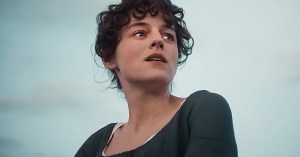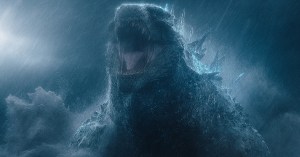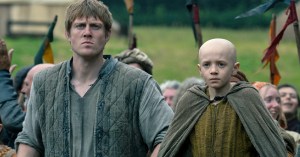Oscar Isaac and the Moon Knight Cast and Directors Talk Character and Collaboration
Actors Ethan Hawke and Layla El-Fouly and directors Mohamed Diab and Justin Benson join the series' star in revealing what Marvel magic sauce went into creating the world of Moon Knight.
Debuting as a minor antagonist in one of Marvel Comics’ 1970s forays into horror, Werewolf By Night, Moon Knight made an unlikely leap to mainstay Marvel superhero thanks to quick quips, a costume design that artists like Bill Sienkiewicz loved to draw, and the character’s penchant for adopting multiple non-costumed identities. With the support of editorial staff and a group of writers including co-creator Doug Moench, and, more recently, Cullen Bunn and Jeff Lemire, he also withstood changing trends in mainstream comics thanks to his core ideas and, eventually, a re-framing of his three major identities as alters of a man with Dissociative Identity Disorder. And this week, audiences will meet one of these major personas when Disney+’s Moon Knight debuts.
Although, curiously enough, it wasn’t Moon Knight’s main civilian identity, Marc Spector, or even billionaire Steven Grant from the comics, but a completely new take on Steven that inspired star Oscar Isaac to return to the Disney fold following his years in Star Wars.
“It just seemed like there was a real opportunity to do something completely different, particularly in the Marvel Cinematic Universe, and to really focus on this internal struggle of this character,” he explained during a recent press conference. In lieu of a man with infinite resources, Moon Knight’s Steven is meeker soul of limited means who works at the British Museum gift shop, where he goes beyond the call of duty by telling customers about ancient Egypt. “It felt like for me, once I got a real take on how I wanted to play Steven and I brought that to everyone, they welcomed that with open arms.”
Part of that approach was to try something a little different with Marvel’s well-known penchant for comedy.
“I thought with Steven, there was a chance [to explore] somebody that doesn’t know they’re being funny,” he said.
The notion was partly inspired by a decision made before he signed on to set the series in London.
“I asked why it was like [that and] the answer was ‘We just have too many characters in New York,’” Isaac said. Building from that, he thought of British comedies like The Office and Stath Lets Flat and pondered, “What if we make him English? What if Peter Sellers was approached with a Marvel project, what would he do?”
The answer: a Steven Grant far less prepared for the Marvel world than even his comic book counterpart.
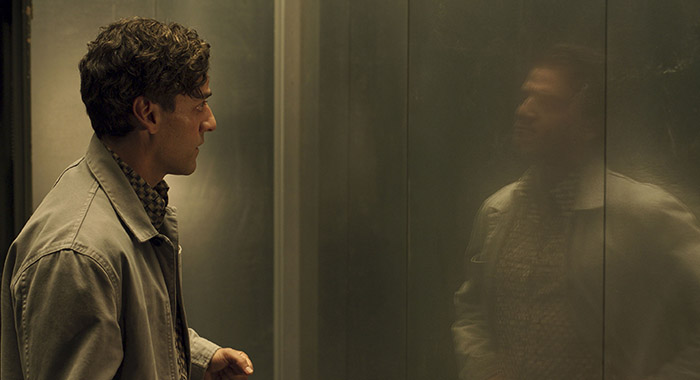
(Photo by Marvel Studios)
But as seen in the handful of trailers and clips Marvel Studios released across the last few months, Steven lives with a second identity: Marc Spector. Viewers will get a few hints about Marc in the first episode, but Isaac also outlined the character.
“Marc, in some ways, leans into a bit of the stereotype of the tortured, dark vigilante guy, but what makes him so special is that he has this little Englishman living inside of him,” Isaac said. The conflict between these two seemingly full individuals living in the same body will lead to much of the drama and some of the comedy to unfold in the series.
As glimpsed in one of the trailers, the conflict will become direct as Steven and Marc find a way to communicate. So, Isaac and the production team had to find a way to realize those scenes.
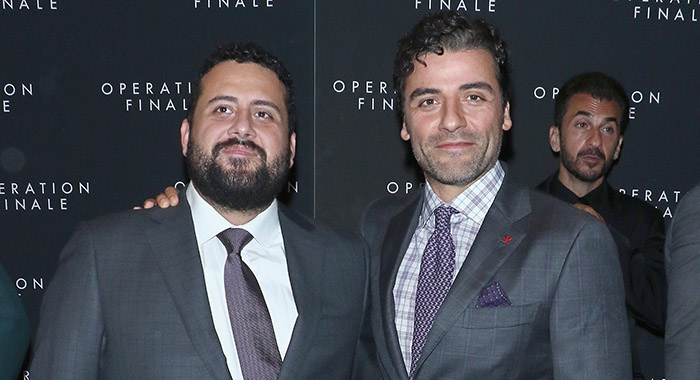
(Photo by Jim Spellman/WireImage)
“The first step was to hire my brother, Michael Hernandez, to come in and be the other me,” Isaac quipped. “That’s the closest thing to me there is on Earth. So, he came in and he would play either Steven or Marc, even do the accent and everything.”
But even with someone who “shares my DNA to play off of,” Isaac was still surprised by the technical challenge of playing two characters in mid-conversation.
“I think maybe the most fun thing about acting is acting opposite somebody and letting something spontaneous happen that you didn’t expect,” he explained, but blocking out the scenes and always prepping for what Steven or Marc might be saying or reacting to — and communicating that to Hernandez — meant “there wasn’t really an opportunity to do that.”
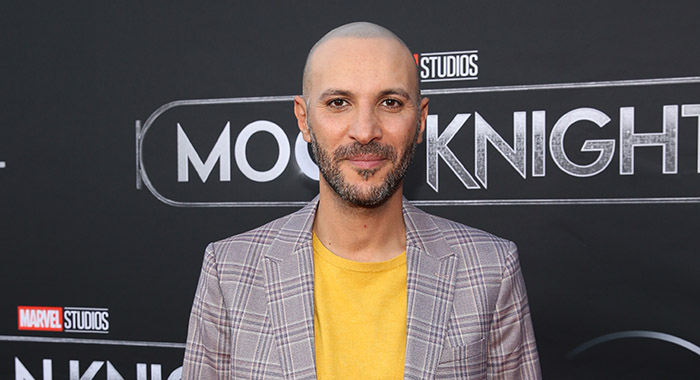
(Photo by Jesse Grant/Getty Images for Disney)
But to have that truly interior struggle set against the superhero antics of the Marvel Cinematic Universe proved to be a draw for episode 1 and 6 director Mohamed Diab, an Egyptian filmmaker known for Amira and Cairo 678.
“I had other offers before to make big-budget movies, but I never connected to anything like this, intimate stories that has some big stuff happening around them. So just imagine that line. You, as a normal person, discovering that you have another identity that is a superhero,” Diab said. He credited head writer Jeremy Slatter for emphasizing that aspect of Moon Knight lore.
Another reason Diab joined up was the opportunity to portray Egypt though a more informed eye.
“As an Egyptian, we always see us depicted as exotic and dehumanized,” he explained, adding that details of the country are also often so wrong that it would be comparable to a film set in Paris using London’s Big Ben as a key locale in the background of scenes. “It’s funny, but it hurts,” he said. Moon Knight, even with its Marvel trappings, offered the chance to “show us as just normal human beings, through Layla’s character, and see Egypt as Egypt.”
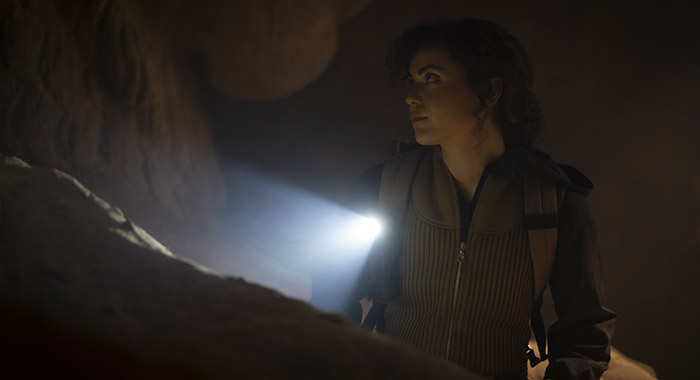
(Photo by Gabor Kotschy/Marvel Studios)
Layla El-Fouly is another character viewers will meet as Steven comes to learn about the world of Moon Knight. She is played by May Calamawy and is something of a departure from Moon Knight’s female cohorts back in the comics (sorry, Marlene). For Calamawy, she’s “strong and she’s for the people and fights for what she believes, but she’s also really vulnerable and scared … I felt like I got to play the full gamut of a woman with her.” As teased above, she seemingly takes the place of Moon Knight comics supporting character Marlene Alraune, which consequently left Calamawy with fewer comics to draw on, but a freer hand in building up Layla as a distinct character.
“As someone who’s grown up in the Middle East, the more I ended up taking from myself, the better and the easier it became,” she explained, crediting her fellow actors and directors for supporting her fight to mold Layla into “what would that look like for someone raised there versus someone raised in the West.”
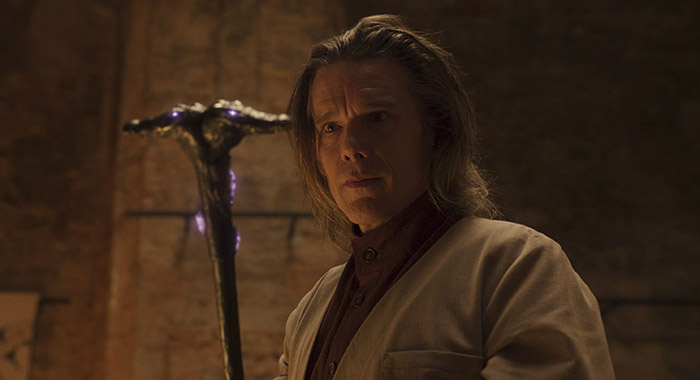
(Photo by Marvel Studios)
One of those actors is Ethan Hawke, who makes his Marvel debut as cult leader Arthur Harrow. The character will strike a chord with viewers thanks to an angle Hawke immediately noticed about Harrow (a seemingly new character with the name of a one-off Moon Knight antagonist) and his position in the pantheon of onscreen baddies.
“The history of movies is paved with storytellers using mental illness as a building block for the villain,” he explained. “And [in Moon Knight] we have a mentally ill hero. That’s fascinating because we’ve now inverted the whole process … I have to find a sane lunatic or a sane malevolent force. [It] was an interesting riddle for me to figure out how to be in dynamics with what Oscar was doing.”
“We came up with somebody who was trying to save the world,” he continued. “And in his mind, he’s Saint Harrow, you know? He thinks he’s gonna be part of the great solution.”
How this plays out once Harrow has conversations with Steven and Marc remains to be seen (and trust us, it is in spoiler country for the moment), but it will quickly prove to be one of the shows unique elements.
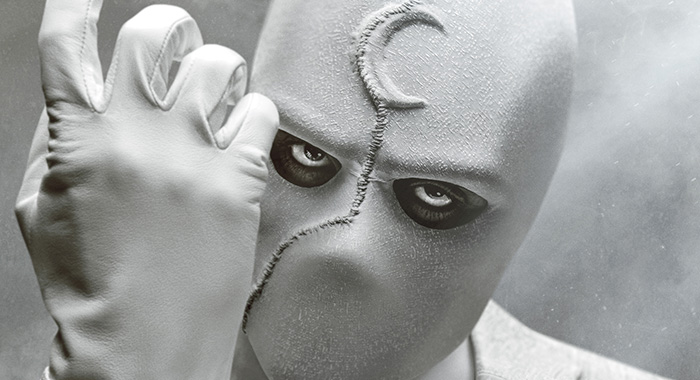
(Photo by Marvel Studios)
Justin Benson, another episode director, also felt the cast were a unique dynamic, saying they found “this deep humanity of humor and pain and everything else in what you might call the great mythology of our time.”
Although there was some sheepishness about regarding the MCU as a great mythological framework, Benson’s directing partner, Aaron Moorehead, was willing to take it on, saying, “It is really cool to actually be a part of that and [to tell] a story that’s actually about these ancient [Egyptian] myths and things that we all grew up on.”
And just as Steven and Marc must eventually learn to collaborate, the cast and crew agreed the show was a particularly welcoming place to share ideas.
“Usually, when there’s a huge budget, there’s a tremendous amount of fear. The people in charge are incredibly controlling, and creativity is reduced,” said Hawke, an actor once roasted on Twitter for his comments about superhero movies. But he credited Marvel with a “confidence” which allowed the actors, directors, and production to experiment more than he assumed possible before getting involved.
“Yes, we are going to cook in your kitchen, but if we stay in the kitchen, we can do what we want. And there was a lot of playfulness and a lot of willingness to fail and a lot of willingness to have bad ideas,” he said. “Because you can’t find a great idea if we don’t say some dumb ones and make mistakes. There was a huge passion to contribute.”
On an Apple device? Follow Rotten Tomatoes on Apple News.





